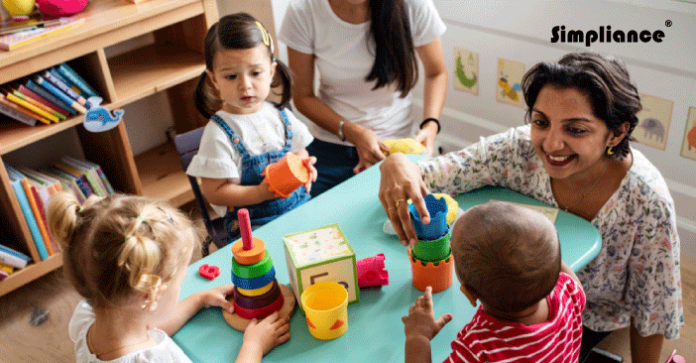
This article has been written by Ashish Bhushan, pursuing the Diploma in Labour, Employment, and Industrial Laws (including POSH) for HR Managers from LawSikho.
Table of Contents
Introduction
India is one of the largest countries with the highest growing population in the world. Approximately 68.4% of the population is a working population. 30.6% amongst this % is the women working for the population. With the ever-increasing population and as the year passes by, more and more women will be adding to the working population. With the increase in the women population, better facilities requirements would be there in every sector of industries and moreover, government support/participation would be required in order to fully fill such requirements and proper implementation of Maternity Benefit Act, 1961. Requirements for women would be better facilities of Creche so that they can take care of their newborn babies till the age of 6. Flexible working hours for women need equal concentration both at work and at home looking after her child.
Background
The Maternity Benefit Act, 1961 is passed by the central government and enforced and implemented by the ruling State Governments in all sectors of industries (includes organized and unorganized sectors) except in the Mines and Circus Industries. The Maternity Benefit Act, amended in the year 2017, it states that for establishments employing minimum of 50 or more employees to provide crèche facility, either separately (like hiring a creche establishment for creche services) or along with common facilities (maybe within the company’s premises or nearby) within a set distance as per the act. The state government from time to time advises all the sectors of industries about strict enforcement and compliances of The Maternity Benefit Act, however, it does not maintain any record of defaulters for not following the creche policy as mentioned in this act. As a result, the companies in India are taking advantage of it and the majority of the companies do not provide creche facilities. Though the state and the central government are aware of the same, no action has been implemented so that the companies can adhere to the same.
Key features in the Maternity Benefit (Amendment) Act, 2017 related to Creche (daycare)
- compulsory crèche (daycare) facilities for every establishment across all sectors employing 50 or more employees. This includes the benefit that the mothers are allowed to visit the crèche four times per day.
- Creche facilities to be set up within prescribed distance from the working premises.
- Creche facilities to be available for children aged up to 6 years.
- a “WFH” i.e., Work from Home option that may be of benefit after the maternity leave expires;
Costs
The act does not say anything about who would be bearing the cost of maintaining the creche. Is it the employee or the employer who would be bearing the expenses of running the Creche? Neither the Maternity Act nor other acts like Factory Act 1948 etc., nor State government act. However, in response to Right to Information, it states that the employer needs to take care of running expenses of the Creche.
Provision of facilities in Creche
Post-implementation of the Maternity Act 2017 (Amendments in 2017), many of the organizations have seriously amended the act. Many Manufacturing units have set up the Creche facilities within their premises so that women working in these units are able to take care of their children by keeping them in the creche. They are able to visit the creche center and see their child’s wellbeing as per the act. The companies who are into the services industries and do not have large areas where they can easily create a creche for their employees, take assistance from third-party companies who provide creche facilities locally. They try to ensure that it is in close proximity to the company (within the reach of 500 meters). Currently in India, two states have implemented the Maternity Act 2017 strictly. They are Karnataka and Haryana. Their initiative in this act will further encourage the other state to follow this pursuit.
The Karnataka Factories Rules, 1969 made & implemented by the state government after the implementation of the Factories Act 1948 by the Central government, the crèche may not be situated in close proximity to any part of the factory where lethal /obnoxious fumes, dust, or odors are given off in the air or in which excessively noisy processes are carried on. The building in which the crèche is situated is required to be of good quality construction and all of the walls and roof must be made of suitable heat-resisting materials and be waterproof. The floor and internal walls of the crèche are required to be so laid or finished as to provide a smooth, impervious surface. The height of the rooms in the building may not be less than 3.7 meters from the floor to the lowest part of the roof and there may not be less than 1.86 sq. m. of floor area for each child to be accommodated.
The employer is required to ensure that there is adequate ventilation of fresh air and suitable toys and furnishing, with cots and cradles and bedding. There should be enough space between each activity area so that movement of small children and elder people can be done without any disturbance and no one is getting injured during this process. It should also ensure that all the material used in managing the creche should be smooth and no pointed surfaces are present as it may hurt the children while at play or during regular movement. All the corners of any object used in the facilities of the creche should be smoothened to avoid untoward incidents.
The creche should have women managing it. The employer should ensure that the women who are hired for managing the creche and children aged up to 6 years are having the qualification required for it. They should ensure a process in which any worker kept for cleaning or pantry work or other small chores are provided with a clean pair of clothes and ensure that hygiene is maintained by themselves.
Taxation concerns
There is a huge question on whether the expenses made by the employer come under tax deduction or are exempted. As per the Income-tax Act, a “prerequisite” means any benefit that is extended to an employee by an employer. Perquisites are generally taxable unless specifically exempted as laid in the Income Tax Act. In the absence of a specific exemption, a crèche facility provided by the employer may be taxable. However, in view of the different models that are being adopted by employers, it may be challenging to determine the total costs incurred by the employer and thereafter apportion them to each employee. Further guidance is required from the Indian tax authorities. As per the latest update from the Income Tax Act, there is no tax exemption extended by the government on Creche Facilities provided by the employer to its employees.
The government should extend support to the employers who are providing creche facilities so that it reduces some burden on them. It will encourage other companies to extend creche facilities to women employees. It is a debatable topic in which both sides should come out and discuss the same.
Conclusion
Whenever a woman employee completes her Maternity break, there is one question that always comes to her mind, i.e., who will take care of her child. All women are not lucky enough to have their parents or in-laws to take care of the child. With urbanization and the cost of leaving on the increasing side, many women are not able to use this option. Hence this creates a doubt in the woman’s mind whether to join back the job or remain in the house taking care of the child. The new Maternity Act [amendment in 2017] is helpful compared to the earlier version, but clearer rules need to be implemented for employers as soon as possible.
India is now surpassing many of the European countries in terms of providing facilities towards Maternity benefits. But the drawback of the same is that the Indian government places the expense of the same on the employer without providing any relief package in terms of any tax rebate. As a result, rich companies take interest in following the creche point in the Maternity Act and implement the same. However, small companies in all sectors get discouraged in following the same creche points. Some companies are so discouraged that they do not want higher women in their organizations. They feel that they do not have the leverage to spend so much money on just employing women. This gives a dent to the government’s futuristic plan of having an equal ratio of men and women in any organization.
The government should work along with the companies. Various societies come out with plans where both the government and companies benefit from implementing the Maternity Benefit Act. The government should also have strict measures where they should audit every company so that they comply with the Maternity Benefit act. Similarly, they are implementing the Provident Fund Act and Bonus Act.
Students of Lawsikho courses regularly produce writing assignments and work on practical exercises as a part of their coursework and develop themselves in real-life practical skills.
LawSikho has created a telegram group for exchanging legal knowledge, referrals, and various opportunities. You can click on this link and join:
 Serato DJ Crack 2025Serato DJ PRO Crack
Serato DJ Crack 2025Serato DJ PRO Crack










 Allow notifications
Allow notifications


